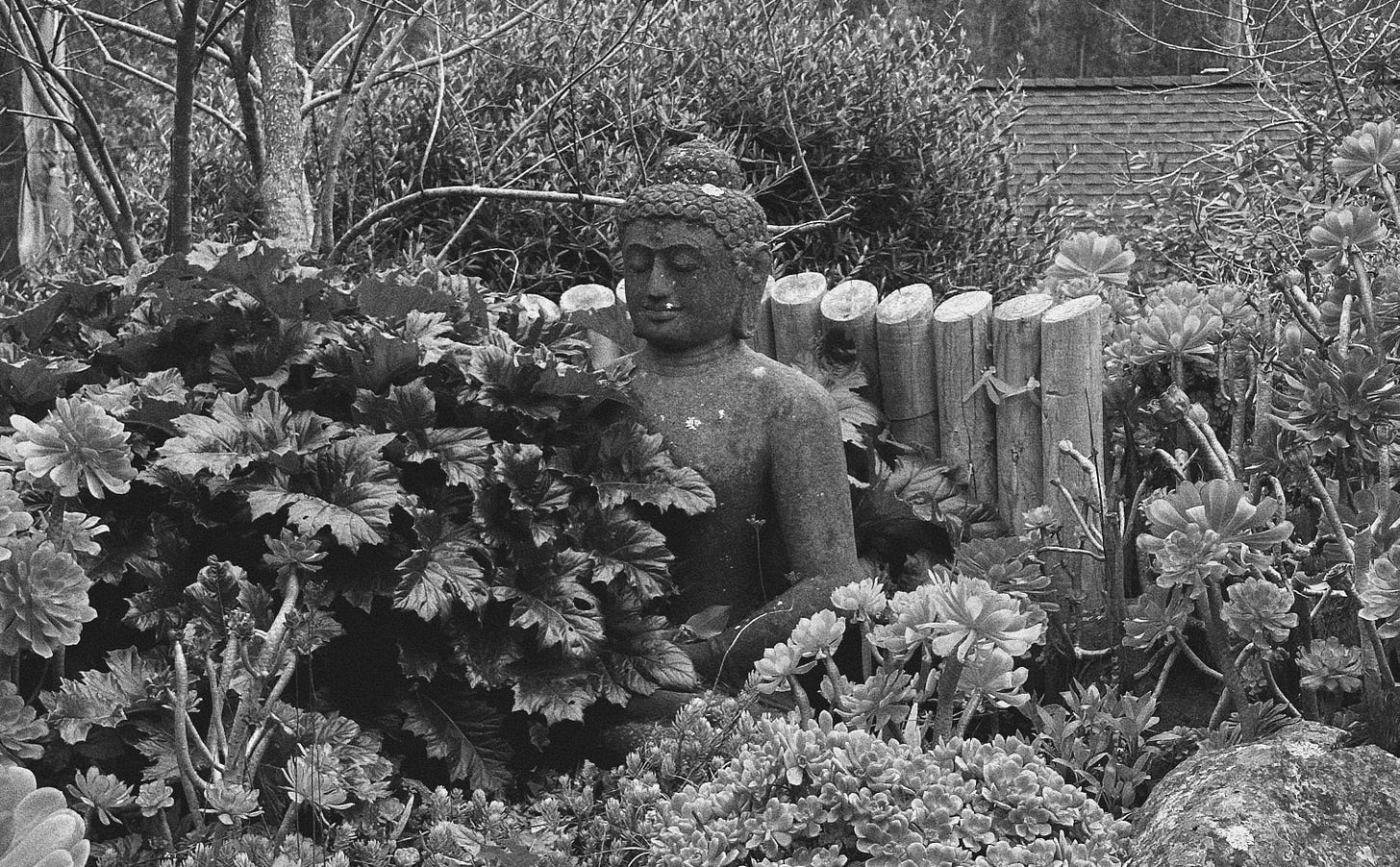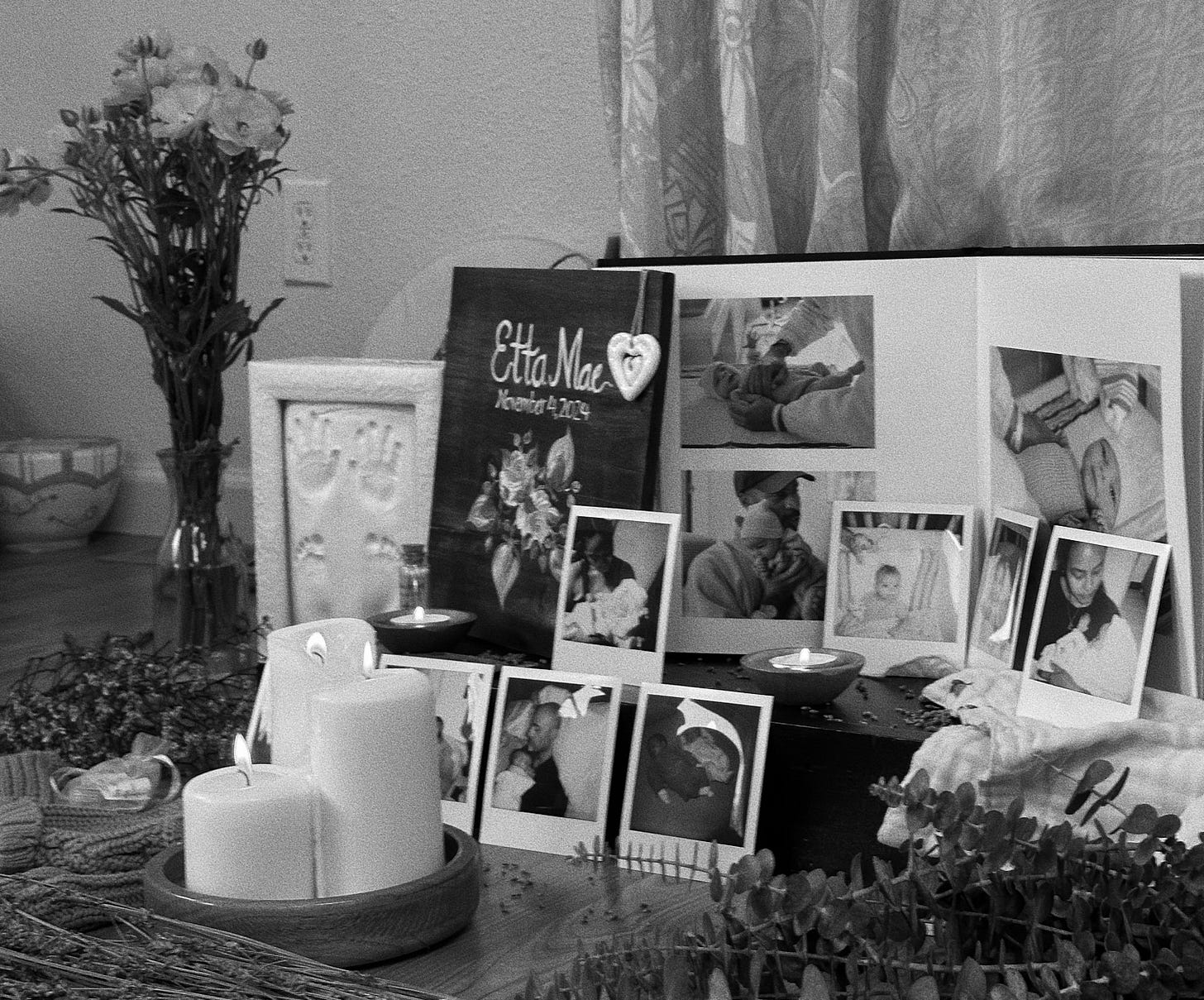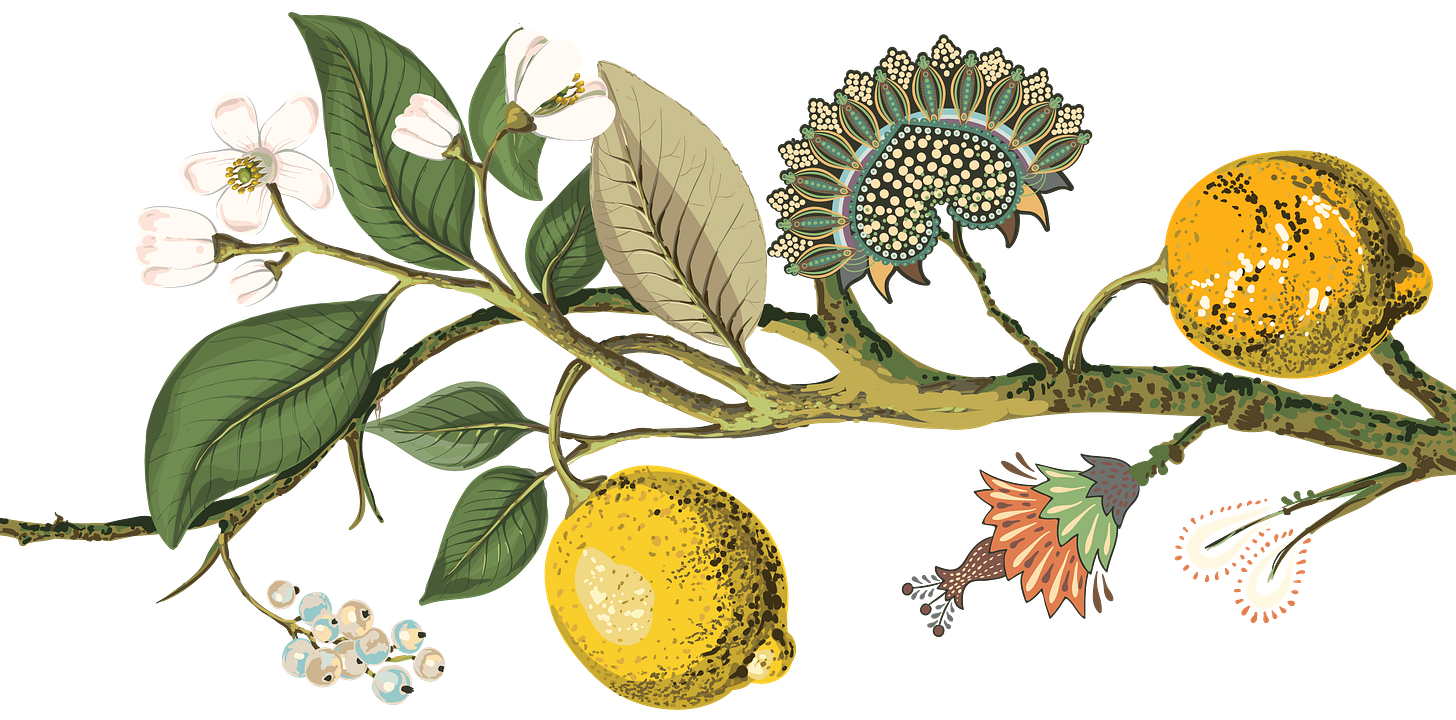I mourn the life that was supposed to be.
Sorrow holds us close: six mothers and a father crying out for our children at a grief ritual in the northern prairies of California. Yet the reprieve I seek lies beyond our ceremony. I peer past our circle of bodies through the large window on the opposite wall. The air wisps through trees in the distant canopy. Light refracts through evergreen branches, dappling the warmth of Komorebi.
High above glides a flock of red-tailed hawks. They float with ease just beneath the clouds, flapping their wings solely to maintain their suspension. They soar with patience and confidence as if they have nowhere else to be, perfectly content.
I envy their weightlessness; it reminds me of the euphoric feeling our sweet girl gave us. She endowed us, her mother and I, with flight. She was the sun at our backs and the songs of vitality beneath our wings. With her, the world felt infinite, perceivable from every direction.
I wonder what the hawks see in us. Do they peer down as we peer up? Do they study us, this tender tribe connected by yearnings for children wrenched from our arms? Directionless parents roaming the fields of lamas and gardens of roses. Can they hear our lamenting? Can they feel our reaching for the skies?
We want nothing more than to soar in the embrace of our babies again. But our wings have been rended. When our children died, we plunged to the Earth. Each morning, we seek the heavens again with outstretched arms and distended cries. Flightless.
My wife, Courtney, and I join with other parents at this grief ritual led by pupils of the great grief sage Francis Weller. His book on sorrow, a gift from my mother, provided improbable comfort to us as we lived out the loss of our daughter in hospice.
Around the circle sit five other mothers who grieve their infants. Their stories of loss fill the room with rage and hurt and love so dense we struggle to breathe. I wonder how they can outlive such trauma. Then I realize they look at me and Courtney and wonder the same. I wish to share their stories and reveal to all the silent torment of infant loss. But apart from my own, they are not my stories to tell.
After hours of listening and writing, my wife and I surrender to the devastation. The tears upend us. Loud, repressed cries erupt from Courtney's throat like geysers from ancient stone. "No. No. No! No!" she shrieks, swaying back and forth. As if to say, "God, I reject your proposition. Choose someone else." But it is too late. Our daughter is gone. All our children are gone. We don't get them back; we have no wings to fly after them. We are stuck here to feel it all. Wherever they live beyond this place, we can't yet join them.
Courtney's defenses crumble. No more projections of wellness or lies of omission; we are not okay. Just two young parents, severed from their purpose, longing for the one thing we can never again have. Soon, the whole room wails with her, the throbbing of drums and rhythms of grief swelling. "No! No! No!" the room bellows into the void as if performing a spell. This is not merely solidarity; this is sorrow coalescing. Our losses become one, a wound we know equally, but by a different name: Kaileah. Arlo. Rylee. Otto. Etta Mae.
These are the spaces that anchor us now. Solemn rooms with damaged souls seeking asylum. Rooms with sentiment as thick as mud. Rooms unafraid to speak plainly about death or name the truth in our losses: nightmarish. An Earthbound tribe reminiscing on what it felt like to fly. Together, we inch towards memories of joy, now distant horizons.
I grieve for these parents as they grieve for me and my wife. I'm sorry, Mama, that you've made a home in affliction. That you feel weary and alone. That nobody seems to understand your hurt. That few dare to ask or have the experience to know what you're enduring. That any happiness you manifest in this lifetime will be tethered to this sorrow. That your husband is not here and that you cannot use this container to mourn and heal together. That waking up daily means repeatedly excavating deeper reservoirs within yourself. I know you are tired. That guilt threatens to drown you. That you've convinced yourself you're responsible for anything but the miracle you created. This is not your fault.
I'm sorry, Papa, that you can't speak your grief. That you are not here beside your partner. Or me. Without you, I am the only father present. I'm sorry that the world has taught you that burying your sadness is safer than confronting it. That silence is a cloak for sorrow. It is not; I still see you and your pain. I wish to see you speak about your hurt and the rage that suffocates you. Maybe you've convinced yourself you're unworthy of fresh air. Perhaps, like me, you feel you have failed in your fatherly duty to shelter, protect and fend off danger. Our task is to find a way to live with it, to not give up on goodness. And trust that the beautiful things, in time, will affirm us, too. I would love to hear your thoughts on all of this. But you are not here.
I mourn the life that was supposed to be. Our Etta Mae. I no longer have access to the skies, but I'm learning that flightlessness is not the same as purposelessness. I know there is beauty to be found on the Earth below, among the weeds and the wounded.
Maybe the hawks fly with such seeming contentment because they've built an appreciation for everything that stirs beneath. They know that the true blessing of flight is the opportunity to observe and offer thanks for the things we take for granted.
I trust I'll grow new wings someday. Until then, I'm surrendering to this entanglement with the Earth. This dwelling with the ants and the worms. To be one with Earth's great web and feel her vibrations between my toes, where death is central to it all.
It's as if my travail through infant loss has granted me access to hallowed, cosmic wisdom. Right now, it is difficult to see beyond the gray malaise of grief. But I've caught glimpses of the other side. I imagine it as a secret garden that few can enter. I feel it readying me for a new chapter. In the garden, the performative veil is lifted, and honesty is luminescent. There, our senses are stretched beyond the laws of space and time. The world looks brighter, more colorful and vivid, as if processed through a kaleidoscopic new spectrum. The garden embraces the oneness of domains we've long seen as separate: life and death; joy and sorrow; peace and conflict. In the garden, the universe hidden beneath our feet finally reveals itself. No insect or fruit or animal is less sacred than a person. And central to the garden's orbit is a reverence for death. Where death is not an ending but the beginning of something more profound. Death is not the end of life, but life itself.
This may be our charge now, the flightless: To step into the secret garden. To embrace our amplified perception. To unearth the treasures hidden in our soils. To name the things we've collectively buried. To salt the Earth with our tears. To finally sing back to the birds. To reattune our hearts to Earth's most urgent pleas. To remind the living what it means to hold and be held. To love. To mourn. To create. To thrust wild expressions into the wind, that our sacred chants might signal spiritual awakening to all who seek its signs. To be free. And even to die.
There are days I wish to fiercely disavow these learnings. To scream, "God, I reject your proposition. Choose someone else!" Why must I bear this unendurable sacrifice? Have I not shown my commitment to patience, goodness and tenderness in all its forms? Must my path be so heavy? I am tired. I have suffered enough. How fervently I would choose life with my daughter in quiet, ignorant bliss rather than bear the pangs of celestial understanding without her.
But here I am. Earthbound and flightless. Maybe this is the life that was supposed to be. I will never view my daughter's death as necessary or as a sacrifice. She did not have to die; she should still be here. Her death is terrible and tragic, but must it be in vain? Perhaps this was Etta's parting gift, helping me and her Mama navigate a tragic, magical world with a lucidity and appreciation we never thought possible. Or perhaps I'm just bargaining with grief. What I do know for sure is that, despite our decades of intention and delight, we are only now learning, from a space beyond materiality, what it truly means to be alive.
The garden awaits.
Writing I’ve Enjoyed Lately:
“Where Tenderness Meets Fire: Annie & Smoke (Sinners)”
by
A beautiful (and topical) portrait of love and the gnawing of history.
By
A charming memory with an unexpected gut punch.
By
A moving poem about coming home to oneself.
by
An intimate snapshot of love and loss.
“A non-exhaustive list of writing (and art) residencies in the so-called US”
by
Go claim your opportunities, family.
Consider checking these folks out.
Thank you for reading.
More from Overture soon.















This is beautiful and oh so painful.
I struggled to put In words the despair from our days of cancer with Joni. And this is that soul crushing world ending despair.. in words. 🖤
Thank you for the vulnerability and courage so find them. May you continue comfort wherever is comes. And know that this art is moving so so many of us.
With deep love and appreciation
Beautiful. Love you so much ❤️